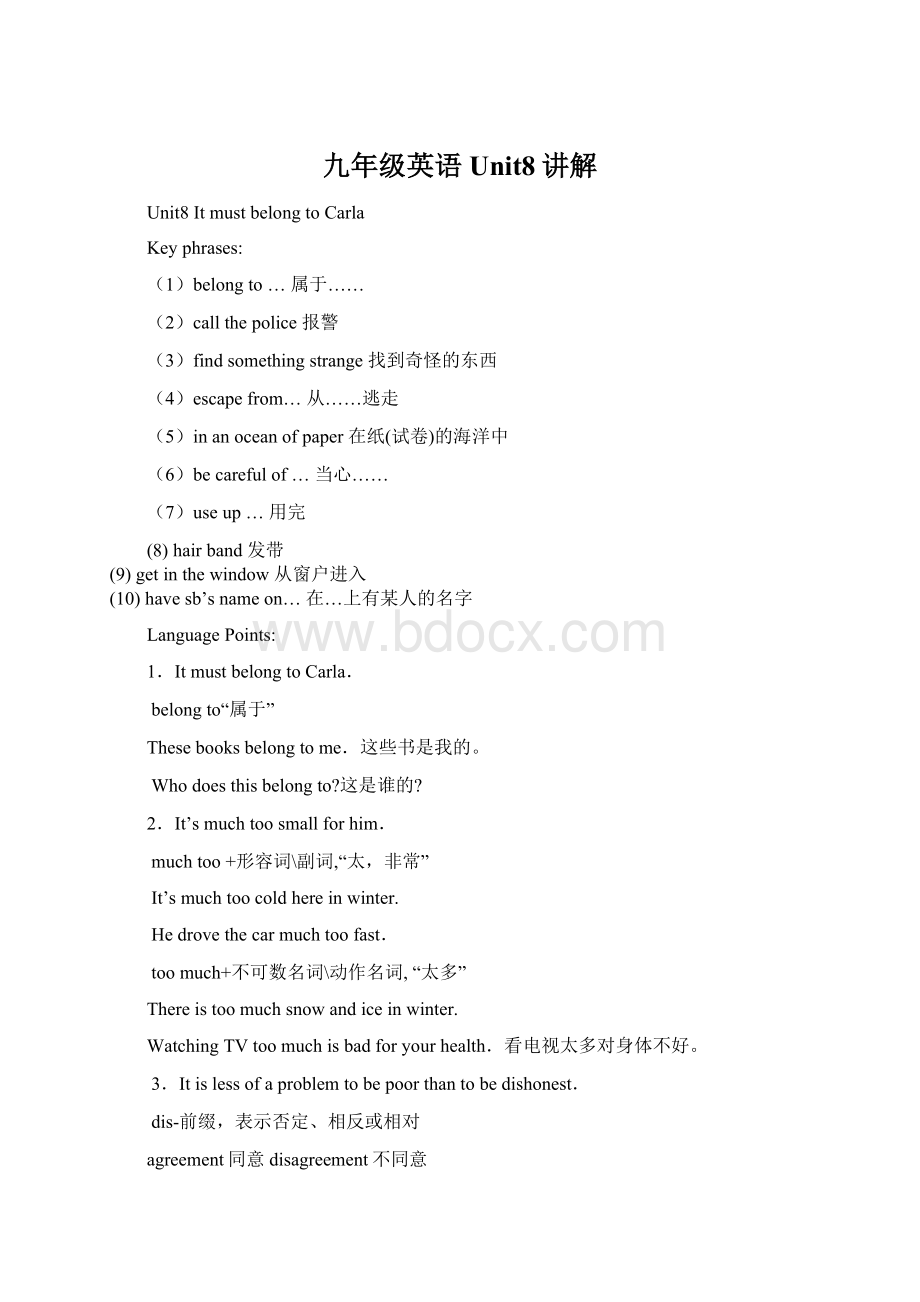九年级英语Unit8讲解.docx
《九年级英语Unit8讲解.docx》由会员分享,可在线阅读,更多相关《九年级英语Unit8讲解.docx(7页珍藏版)》请在冰豆网上搜索。

九年级英语Unit8讲解
Unit8ItmustbelongtoCarla
Keyphrases:
(1)belongto…属于……
(2)callthepolice报警
(3)findsomethingstrange找到奇怪的东西
(4)escapefrom…从……逃走
(5)inanoceanofpaper在纸(试卷)的海洋中
(6)becarefulof…当心……
(7)useup…用完
(8)hairband发带
(9)getinthewindow从窗户进入
(10)havesb’snameon…在…上有某人的名字
LanguagePoints:
1.ItmustbelongtoCarla.
belongto“属于”
Thesebooksbelongtome.这些书是我的。
Whodoesthisbelongto?
这是谁的?
2.It’smuchtoosmallforhim.
muchtoo+形容词\副词,“太,非常”
It’smuchtoocoldhereinwinter.
Hedrovethecarmuchtoofast.
toomuch+不可数名词\动作名词,“太多”
Thereistoomuchsnowandiceinwinter.
WatchingTVtoomuchisbadforyourhealth.看电视太多对身体不好。
3.Itislessofaproblemtobepoorthantobedishonest.
dis-前缀,表示否定、相反或相对
agreement同意disagreement不同意
ability能力disability残疾
advantage优势disadvantage不利条件
honest诚实的dishonest不诚实的
4.no的用法
★表示某事被禁止
Nopets.NoTVonschool.Nosmoking.
★no+n.“没有,无”=not…any/not…a
Wehavenofriendshere.
=Wehaven’tanyfriendshere.
Ihavenotimeata11towritetoyou.
★用作否定回答
Isitraining?
下雨吗?
No,itisn’t.没下。
5.Ifyouhaveanyideawhereitmightbe,pleasecallme.
Ifyouhaveanyidea...(若干的,有多少)
=Ifyouknow...“如果你知道……”
6.beanxiousabout担心;渴望的
=beworriedabout=beconcernedabout
Weareanxiousaboutherstudies.
Maryhasbeenanxiousaboutyourreturn.
玛丽急切盼你回来.
7.unhappy是happy的反义词,由un+happy组合而成。
前缀例词派生词
un-“不”happyunhappy
likeunlike
gratefulungrateful
friendlyunfriendly
luckyunlucky
8.Myparentscalledthepolice,buttheycan’tfindanythingstrange.
thepolice复数名词,“警察、警方”,
指一个警员,用apoliceman或apolicewoman
policestation警察局
9.Inmydream,Iwasswimminginanoceanofpaper.在我的梦中我浸泡在数不尽的试卷中
(in)anoceanof或(in)oceansof
“极多的,用不尽的”,口语中常用
Hethinkshehasoceansoftime.
他认为他有用不尽的时间。
10.escapefrom=runaway逃走逃离
Thatmanescapedfromprisononthewindynight.
Gas(煤气)escapesfromthepipes.
11.drop
*v.滴滴下
Youmustdropmedicinefivetimesaday.
*丢下落下放下
Don’tdroptheteapot.
Canyoudropmeatthenextstop?
*放弃=giveup
Hewantstodrop/giveupEnglish.
12.Therebesb.doingsth有人正在做….
Therearesomepeoplesittingandchattingunderthetree.
Grammar:
表示推测的情态动词
情态动词无人称和数的变化,情态动词后面跟的动词需用原形,否定式构成是在情态动词后面加“not”。
个别情态动词有现在式和过去式两种形式,过去式可以用来表达更加客气、委婉的语气,时态性不强,可用于过去,现在或将来。
答非所问的情态动词
一、在回答must开头的一般疑问句时,肯定回答用must,否定回答用needn’t或don’thaveto。
如:
1.—MustIfinishmyhomeworkbefore
eighto’clock?
—Yes,youmust.
2.—MustIattendthemeeting?
—No,youneedn’t.
(No,youdon’thaveto.)
YoucanaskTomtogoinstead.
二、在回答may开头的一般疑问时,肯定回答用may,其否定回答用mustn’t。
如:
1.—MayIwatchTVaftersupper?
—Yes,youmay./No,youmustn’t.
2.—MayIstophere?
—No,youmustn’t.
三、在回答need开头的一般疑问句时,肯定回答用must,否定回答用needn’t。
如:
1.—Needwestaybehindafterschool?
—Yes,youmust.
2.—Needhegonow?
—No,heneedn’t.
四、在回答could/can/may/mightwill所构成的表示征询对方意见或表示请求的一般疑问句时,肯定回答用can或may,否定回答常用can’t。
如:
1.—Canyoucomeandseemetomorrow?
—Yes,Ican.
2.—CouldIenterthelab?
—No,youcan’t.
3.—MightIborrowyourumbrella?
—Ofcourseyoucan./may.
4.—CouldIborrowyourcar?
—No,I’mafraidyoucannot.
在英语中,表示推测的时候,我们通常会用到以下情态动词:
can,may,must,need,could,might,can’t,couldn’t等.
一.can和could的区别和用法
1.can表示体力和脑力方面的能力,或根据客观条件能做某种动作的“能力”。
IcanspeakEnglish.
can用在否定句和疑问句中时有时表示说话人的“猜测”或“不肯定”。
Wherecanhebe?
2.could是can的过去式,表示过去有过的能力和可能性,还有怀疑和不肯定的意思(在否定和疑问句中)。
Thedoctorsaidhecouldhelphim.(能力)
could用来提问,是有礼貌的请求Could...,please?
语气较为婉转。
CouldIspeaktoMr.Smith,please?
二.may和might的用法如下:
1.may的用法:
a.表示“允许”或“请求”。
MayIcomein?
注意:
may表“允许”的否定形式must’t
—MayItakethisbookoutofthereading-room?
—No,youmustn't.不行。
b.表示说话人的猜测,认为某一事情“或许”或“可能”发生。
Hemayknowtheanswer.
c.may用在感叹句中可表示祝愿、愿望。
Mayyousucceed.(祝你成功。
)
2.might的用法:
(1)是情态动词may的过去式
e.g.HesaidthatImightborrowhisbike.
(2)是may的虚拟语气形式,不表示过去,而表示现在或将来“可以,可能”,但语气更委婉、客气,有时表示对可能性有所怀疑。
a.MightIborrowyourbike?
b.Hemightcometoday.今天他可能会来
三.must与haveto的区别
haveto比较强调客观需要,must着重说明主观看法。
另外haveto能用于更多时态,比较下面的句子:
Wemuststudyhard.
It’sraininghard.Wehavetostayathome.
mustbe表示推测,“一定”或“准是”
Thismustbeyourroom.
Theremustbeamistake.
回答由must引起的问题时,肯定回答用must,否定回答用needn't或don'thaveto,
—Mustwehandinourexercisestoday?
—No,youneedn't.
mustnot的否定形式则表示“不应该”或“不许可”,语气比较强烈。
Youmustn'tplayontheroad.
4)must表示“偏要”
—Howoldareyou,madam?
—Ifyoumustknow,I’mtwiceyourage.
Naturally,afterItoldherwhattodo,mydaughtermustgoanddotheopposite.
Unit5单元测试
语法专题...情态动词I
1—5CADCB
6—10ADCDC
11—15BDDCD
16—20DAACB
21—25BACAD
26—30CCDBD
31—35CDCDC
36—40BBDCD
41—45BADAC
46—50ABBCA
情态动词II
1.1-5ADABB
2.1-5CDBCA
3.1-3CAA
4.1-3DBC
5.1-4CBCC
6.1-3BAB
7.1-3CCC
8.1-3ADB